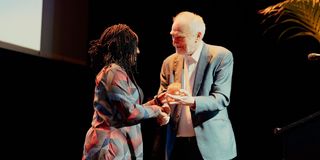Kenya’s Elizabeth Wathuti receives 2023 Amnesty International Chair Award

Kenya’s environment and climate activist Elizabeth Wathuti is this year’s recipient of the 2023 Amnesty International Chair Award.
Kenya’s environment and climate activist Elizabeth Wathuti is this year’s recipient of the 2023 Amnesty International Chair Award.
This comes after she was presented with the honour on Wednesday during the ‘Chair Ceremony’ at the University of Ghent in Ghent, Belgium.
The Amnesty International Chair is awarded each year to an individual who has made an outstanding contribution to human rights worldwide.
Last year, Gloria Wekker was awarded the Chair, for her work on gender, sexuality, racism, feminism and intersectionality.
Speaking to the Nation after receiving the award, Ms Wathuti said that she is deeply grateful and honoured.
“I want to start by acknowledging that it may not be obvious to everyone why I – an environmentalist and a climate activist – am receiving a human rights award. For a long time, the environment has been seen as something out there, beyond us and somehow separate from human affairs,” she said.
“So we have organized ourselves into different tribes – environmental defenders and human rights defenders – and focused on our separate domains but we are learning the hard way that this separation is a dangerous illusion,” she said.
“By giving me this award, Amnesty International and the University of Ghent are recognising our common cause. We are all defenders of a dignified life. We are all defenders of this beautiful planet that we call home. The work that I do is deeply rooted in nature,” the young activist said.

Kenya’s Elizabeth Wathuti was presented with the honour on Wednesday during the ‘Chair Ceremony’ at the University of Ghent in Ghent, Belgium.
“I was born and raised in a wonderful village in Tetu Constituency, in Nyeri County, which is the most forested region in Kenya and home to the late Nobel Laureate, Professor Wangari Maathai, who was the first African woman and environmentalist to win the Nobel Peace prize…, indeed a place of abundance. The fastest river in Africa, the Gura river, was flowing just close to home, and I remember it was scary going there alone as the water levels were too high and it was flowing so fast,” Ms Wathuti said.
“I have childhood memories of chasing butterflies, gazing at flowers - trees ahead of me, bushes beside me - and running up the hills. That love got me where I am today, fighting for the survival of the forests, wildlife, people, and the entire environment I grew up with.”
Ms Wathuti added that she has now realised how important it is to link local action on the ground, the work she is doing back at home with the children, youths, and local communities with international advocacy.
“I have learned and taught myself how to get people to care about issues such as climate change and take action even when they are not yet at their doorsteps because I have already seen, felt, and experienced them at my doorstep firsthand,” she said.
“There are so many challenges we have to face collectively on our planet. The only way we can achieve real change is through urgent collaborative action and compassionate dialogue, and receiving the Ghent University Amnesty International Chair is a great honour and opportunity to strengthen those connections.”
Ms Wathuti said she is inspired by the late Wangari Maathai.
“This evening, I’m reminded of these great words from Professor Wangari Maathai, “In the Course of History, there comes a time when humanity is called to shift to a new level of consciousness, to reach the higher moral ground. A time when we have to shed our fear and give hope to each other. That time is now.”





